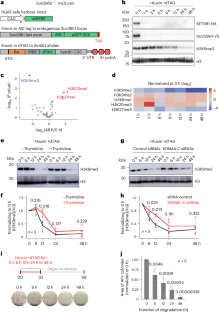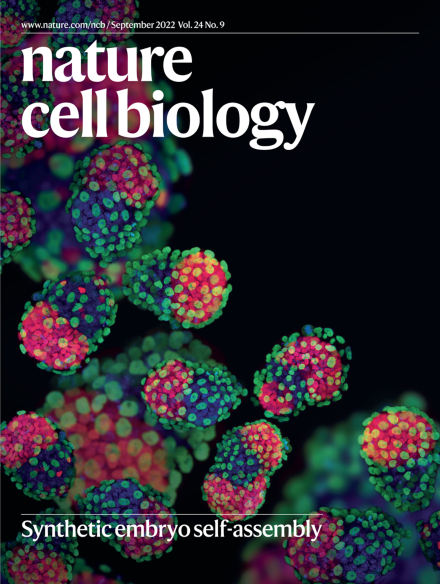不同的H3K9me3异染色质维持动态管理着多能细胞中的不同基因程序和重复序列
IF 17.3
1区 生物学
Q1 CELL BIOLOGY
引用次数: 0
摘要
H3K9me3异染色质由赖氨酸甲基转移酶(KMTs)建立,并由异染色质蛋白1(HP1)同工酶压实,可抑制替代系基因和DNA重复序列。目前,我们对H3K9me3异染色质稳定性的了解仅限于单个结构域和DNA重复序列。在这里,我们设计了Suv39h2-基因敲除的小鼠胚胎干细胞,使其在1小时内降解剩余的两个H3K9me3 KMT,并发现被动稀释和主动去除都有助于H3K9me3在12-24小时内的衰变。我们发现了整个基因组中四种不同的H3K9me3衰减率,以及可预测稳定性等级的染色质特征和转录因子结合模式。一个 "二元开关 "控制着异染色质的压实,当KMT耗竭时,HP1迅速从异染色质中解离,HP1的特定阈值水平限制了先驱因子的结合、染色质的开放以及在12小时内脱离多能性。我们的研究结果揭示了不同的H3K9me3异染色质维持动态,它们管理着基因网络和重复序列,共同保护着多能性。本文章由计算机程序翻译,如有差异,请以英文原文为准。


Distinct H3K9me3 heterochromatin maintenance dynamics govern different gene programmes and repeats in pluripotent cells
H3K9me3 heterochromatin, established by lysine methyltransferases (KMTs) and compacted by heterochromatin protein 1 (HP1) isoforms, represses alternative lineage genes and DNA repeats. Our understanding of H3K9me3 heterochromatin stability is presently limited to individual domains and DNA repeats. Here we engineered Suv39h2-knockout mouse embryonic stem cells to degrade remaining two H3K9me3 KMTs within 1 hour and found that both passive dilution and active removal contribute to H3K9me3 decay within 12–24 hours. We discovered four different H3K9me3 decay rates across the genome and chromatin features and transcription factor binding patterns that predict the stability classes. A ‘binary switch’ governs heterochromatin compaction, with HP1 rapidly dissociating from heterochromatin upon KMT depletion and a particular threshold level of HP1 limiting pioneer factor binding, chromatin opening and exit from pluripotency within 12 h. Unexpectedly, receding H3K9me3 domains unearth residual HP1β peaks enriched with heterochromatin-inducing proteins. Our findings reveal distinct H3K9me3 heterochromatin maintenance dynamics governing gene networks and repeats that together safeguard pluripotency. Zhang et al. uncover different dynamics underlying the maintenance and regulation of H3K9me3-enriched heterochromatin domains in mouse embryonic stem cells and propose that loss of H3K9me3 occurs through two distinct dynamic modes: passive dilution and active removal.
求助全文
通过发布文献求助,成功后即可免费获取论文全文。
去求助
来源期刊

Nature Cell Biology
生物-细胞生物学
CiteScore
28.40
自引率
0.90%
发文量
219
审稿时长
3 months
期刊介绍:
Nature Cell Biology, a prestigious journal, upholds a commitment to publishing papers of the highest quality across all areas of cell biology, with a particular focus on elucidating mechanisms underlying fundamental cell biological processes. The journal's broad scope encompasses various areas of interest, including but not limited to:
-Autophagy
-Cancer biology
-Cell adhesion and migration
-Cell cycle and growth
-Cell death
-Chromatin and epigenetics
-Cytoskeletal dynamics
-Developmental biology
-DNA replication and repair
-Mechanisms of human disease
-Mechanobiology
-Membrane traffic and dynamics
-Metabolism
-Nuclear organization and dynamics
-Organelle biology
-Proteolysis and quality control
-RNA biology
-Signal transduction
-Stem cell biology
 求助内容:
求助内容: 应助结果提醒方式:
应助结果提醒方式:


